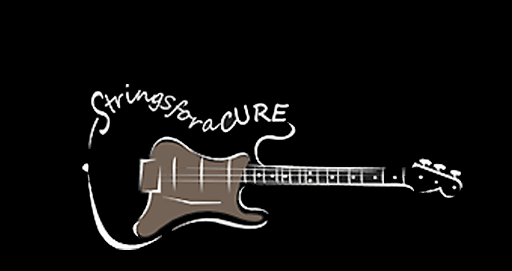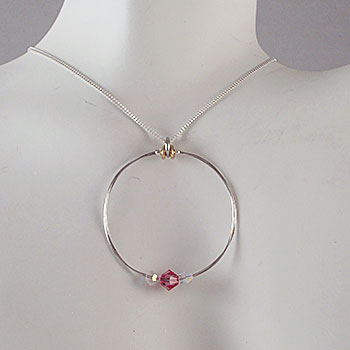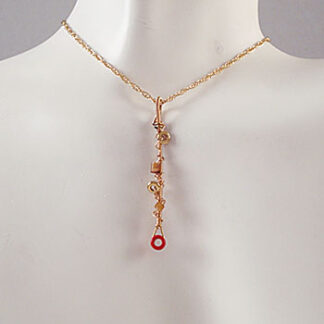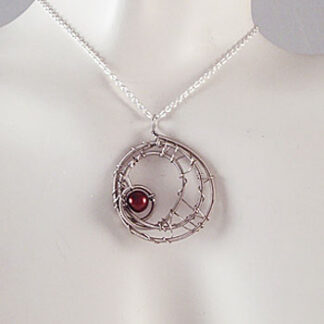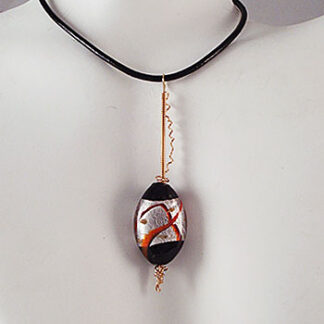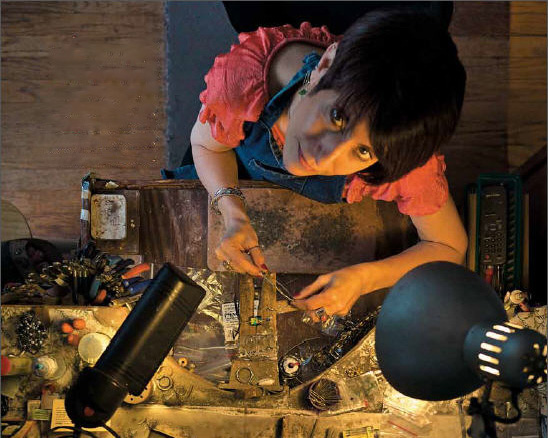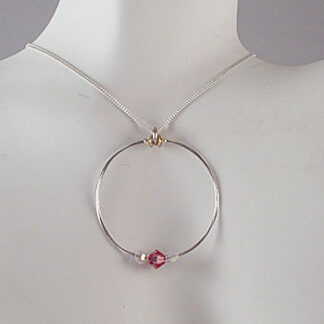Description
One-of-a-kind guitar string pendant made out of Lyle Lovett’s used/played guitar strings. Designed by jeweler and 2x breast cancer survivor Elisa Guida. Pendant is app. 1 3/8″ and comes with a 5mm pink Swarovski crystal and 2-4mm aurora borealis Swarovski crystals. Pendant comes with a 16, 18 or 20″ sterling silver chain with lobster clasp. Due to the high demand of the StringsforaCURE® jewelry orders take 6-8 weeks to complete. Pendant is hand-made and may vary slightly. If you want a different Swarovski crystal color email elisa@stringsforacure.org
Musician’s Release Form: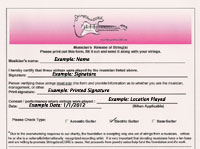
Click To View Form
Artist Biography by Stephen Thomas Erlewine
Lyle Lovett was one of the most distinctive and original singer/songwriters to emerge during the ’80s. Though he was initially labeled as a country singer, the tag never quite fit him. Lovett had more in common with ’70s singer/songwriters like Guy Clark, Jesse Winchester, Randy Newman, and Townes Van Zandt, combining a talent for incisive, witty lyrical detail with an eclectic array of music, ranging from country and folk to big-band swing and traditional pop. Lovett‘s literate, multi-layered songs stood out among the formulaic Nashville hit singles of the late ’80s as well as the new traditionalists who were beginning to take over country music. Drawing from alternative country and rock fans, Lovett quickly built up a cult following which began to spill over into the mainstream with his second album, 1988’s Pontiac. Following Pontiac, his country audience declined, but his reputation as a songwriter and musician continued to grow, and he sustained a dedicated cult following throughout the ’90s.Born in Klein, Texas — a small town named after his great-grandfather, a Bavarian weaver called Adam Klein, which later became a Houston suburb — Lovett was raised on his family horse ranch. He didn’t begin his musical career until he began writing songs while he attended Texas A&M University in the late ’70s, where he studied journalism and German. While he was a student, he performed covers and original songs at local folk festivals and clubs. As a graduate student, he traveled to Germany to study and continued to write and play while he was in Europe. However, he didn’t begin to pursue a musical career in earnest until he returned to America in the early ’80s.
Upon his return to the States, Lovett played clubs throughout Texas, eventually landing a spot in the 1983 Mickey Rooney TV movie Bill: On His Own. The following year Nanci Griffith, whom Lyle had interviewed for a school paper while he was in college, recorded his “If I Were the Woman You Wanted” on her Once in a Very Blue Moon album. He also sang on the album as well as her 1985 record Last of the True Believers. Guy Clark heard a demo tape of Lovett‘s songs in 1984 and directed it toward Tony Brown of MCA Records. Over the next year, MCA worked out the details of a record contract with Lyle. In the meantime, he made his first recorded appearance on Fast Folk Magazine, Vol. 2 #8 later in the year. Lovett signed with MCA/Curb in 1986, releasing his eponymous debut later in the year. Lyle Lovett received excellent reviews, and five of its singles — “Farther Down the Line,” the Top Ten “Cowboy Man,” “God Will,” “Why I Don’t Know,” and “Give Back My Heart” — reached the country Top 40. Despite his strong showing on the country charts, it was clear from the outset that Lovett‘s musical tastes didn’t rely on country, though the genre provided the foundation of his sound. Instead, he incorporated jazz, folk, and pop into a country framework, pushing the musical boundaries of each genre. Pontiac, his second album, revealed exactly how eclectic and literate Lovett was. Greeted with overwhelmingly positive reviews from both country and mainstream publications upon its 1987 release, Pontiac expanded his audience in the pop and rock markets. The album charted in the lower reaches of the pop charts and slowly worked its way toward gold status. While his pop audience grew, his country fan base began to shrink — “She’s No Lady” and “I Loved You Yesterday” both made the Top 30, but after those two songs, none of his other singles cracked the country Top 40. It didn’t matter that Lovett‘s country audience was disappearing — Pontiac had gained enough new fans in the pop mainstream to guarantee him a strong cult following. To support Pontiac, he assembled His Large Band, which was a modified big band complete with guitars, a cellist, a pianist, horns, and a gospel-trained backup singer named Francine Reed. Lovett recorded his third album, Lyle Lovett and His Large Band, with his touring band. Like its two predecessors, the album was well-received critically upon its early 1989 release, and it performed well commercially, peaking at number 62 and eventually going gold. Perhaps because of the album’s eclectic, jazzy sound, the album produced only one minor country hit in “I Married Her Just Because She Looks Like You,” but his straight rendition of Tammy Wynette‘s “Stand by Your Man” received a great deal of attention in the media.
